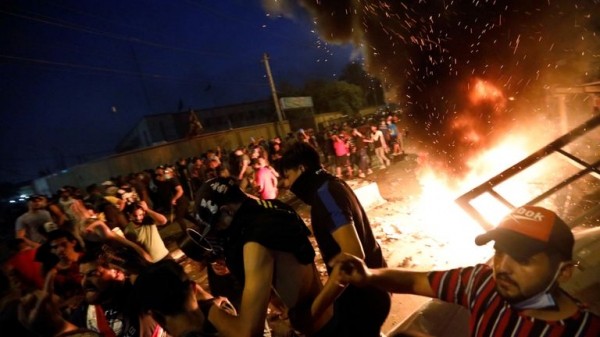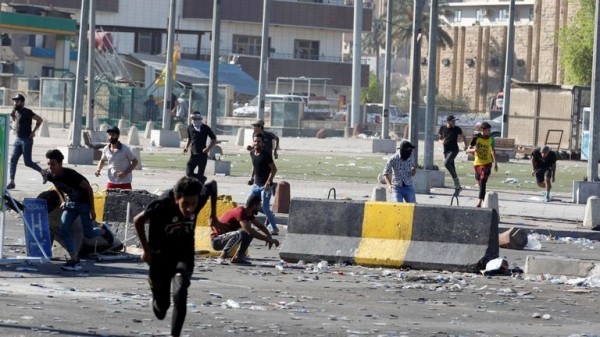After the disastrous US-led invasion, Iraq remains in turmoil with a sense of hopelessness among young people.

It’s 16 years since British, American and other western troops launched an invasion of Iraq to oust Saddam Hussein.
We know it was a disastrous war which defined the legacy of both George W Bush and Tony Blair.
But in one way or another, it has, ever since, defined the lives of Iraqis across the country.
After Saddam’s Baathist Army was defeated, there was a brief moment of hope. I remember the optimism from my time based in Baghdad in 2004.
But with no western plan for how to bring the country together after years of dictatorship, Iraqis began to fight one another. Sectarian and religious divides, kept at bay by Saddam’s rule, emerged and festered.
For nearly a decade, an insurgency killed thousands and framed the lives of the whole population.
Out of the insurgency, ISIS then emerged and took control of cities and towns across the country providing a new bloody focus.
Against that backdrop, its no wonder the place today is in such a mess.
What’s different about the protests over the past few days is the simplicity of the demands. The young protesters do not appear to hold political or religious allegiances. There is no nationalist or Islamist drive behind any of it.
Chaos in #Iraq right now.
?35+ dead. 100s wounded
? Web blackout much of Thurs so casualties could be higher
? PM @AdilAbdAlMahdi spoke overnight to try to calm things
?@amnesty issues calls for calm (https://t.co/jeYkIaK1Pm)
Watch video in this thread – @SkyNews [thread] https://t.co/429B5oAwpe— Mark Stone (@Stone_SkyNews) October 4, 2019
The protests are primal, spontaneous and appear to be leaderless: young men and women calling for jobs, government accountability, the restoration of basic services: education, health, an end to the cronyism among the ruling elite.
Social media was driving the movement until the government shut down the internet. The rallying hashtag is ‘I’m protesting for my rights’ in Arabic.
There is a patriotism around the movement with many protesters carrying the Iraqi flag.
The statistics tell the story of the protest. Like countries across the region, Iraq has a young population. Youth unemployment stands at more than 20%.

The protesters are made up, to a significant degree, of young graduates with no job and no prospect of getting one.
According to the World Bank, one in five of Iraqis aged between 15 and 24 is not in education or employment or training.
There is a sense of genuine hopelessness. Young Iraqis ask how such an oil rich country can fail to provide basic services. There is a profound sense that unknown and inept politicians are siphoning off millions of dollars and live in luxury whilst they still suffer.
Similar protests over the past few summers have been prompted by water and electricity shortages and well as acute environmental concerns.
Prime Minister Adel Abdul-Mahdi has been in power a year – a compromise candidate from the last fraught election.
Predictably he promised to fight corruption and change the nation. But predictably too, he has disappointed.
An added dimension in the current protests is anger over the demotion/sidelining of a very popular Iraqi Special Forces General – Abdulwahab al Saadi. He led campaigns against the Islamic State across the country culminating in Mosul.
He pumped a national sense of pride and patriotism with his successful battle against IS.
One of the slogans of these protests is “no place for patriots in Iraq” – the inference being that they feel there’s no space for Iraqi patriots, only for surrogates or cronies of foreign powers.

There is resentment by Iraqis of continued foreign meddling. The legacy left by Untied States after 2003 lingers with US troops still in the country fighting a resurgent Islamic State (IS).
And the fight against IS has also bolstered the influence of Iranian militia inside Iraq. They now operate alongside the Iraqi military in the fight against IS and consequently wield sectarian political power too.
The protesters say they want to topple the government. That would create a vacuum at a critical moment for regional security in a country which America considers central to its Middle East policy. Iraq is unique in the region in that it has an ally in both Iran and the United States.
The influence of key religious clerics Muqtada al-Sadr and Ayatollah Sistani could be critical. Al Sadr, a Shia cleric, whose militia were a thorn in the side of UK troops back in Basra in 2003, has not openly backed the protesters yet.

If he was to call for the toppling of the government it could tip the balance.
The Iraqi unrest is not unique or contained. It represents a theme of dangerous disgruntlement which is running through many countries in the region – Lebanon, Jordan, Egypt – but most acute, right now, in Iraq.
Next article
Hong Kong protester shooting ushers in new phase of conflict
